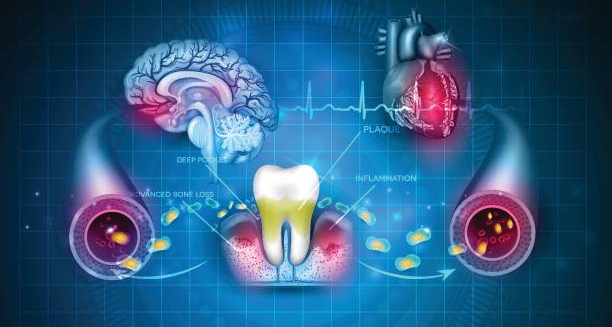Causes of Gum Disease
The causes of Gum Disease are primarily bacterial, though a variety of lifestyle, health, and genetic factors influence its development. At its core, the causes of Gum Disease begin with plaque — a sticky film of bacteria that forms on the teeth — but progression depends on how the body responds and how well oral hygiene is maintained.
Understanding these causes allows for better prevention, early detection, and effective treatment of both gingivitis and more advanced periodontal disease.
1. Dental Plaque: The Root Cause
The most direct cause of Gum Disease is plaque accumulation. Plaque is:
A soft, colourless film of bacteria
Formed when bacteria feed on sugars and starches in the mouth
Easily removed with brushing and flossing
If not removed, plaque:
Hardens into tartar (calculus) within 24 to 72 hours
Tartar cannot be removed with brushing and must be eliminated by a dentist
Acts as a reservoir for bacteria, triggering gum inflammation
This is the starting point of gingivitis, the earliest form of Gum Disease.
2. Smoking and Tobacco Use
Tobacco is one of the strongest risk factors for Gum Disease. It:
Reduces blood flow to the gums, impairing healing
Weakens the body’s immune response
Increases tartar build-up and bacterial colonisation
Masks symptoms such as bleeding gums, delaying diagnosis
Smokers are up to seven times more likely to develop periodontitis than non-smokers, and outcomes from treatment tend to be poorer.
3. Poor Oral Hygiene Habits
Infrequent or incorrect brushing and flossing allow plaque to:
Accumulate near the gumline
Enter periodontal pockets
Progress into deeper layers of gum and bone tissue
Neglecting routine dental check-ups and cleanings further accelerates the problem, as tartar build-up goes unnoticed.
4. Hormonal Changes
Certain hormonal shifts can increase gum sensitivity and inflammation:
Puberty
Pregnancy
Menstruation
Menopause
During these times, gums may respond more strongly to plaque, resulting in temporary or chronic inflammation if not managed properly.
5. Diabetes and Other Chronic Illnesses
Uncontrolled diabetes significantly increases the risk of Gum Disease due to:
Impaired blood circulation
Reduced resistance to infection
Elevated glucose in saliva, feeding bacteria
Other chronic conditions such as HIV/AIDS, leukaemia, and autoimmune diseases may also heighten vulnerability due to immune suppression.
6. Medications
Several medications can contribute to Gum Disease, either by causing dry mouth or affecting gum tissue. These include:
Antihistamines
Antidepressants
Calcium channel blockers (used for blood pressure)
Anti-epileptics (like phenytoin)
Reduced saliva flow increases the risk of plaque accumulation, while some drugs can cause gum overgrowth (gingival hyperplasia), making oral hygiene more difficult.
7. Nutritional Deficiencies
A diet lacking in essential nutrients can impair gum health. Key nutrients include:
Vitamin C: Deficiency may cause bleeding gums and slow healing
Calcium and vitamin D: Important for bone and tooth strength
Antioxidants: Help control inflammation
Processed foods high in sugar and low in fibre contribute to plaque formation and bacterial imbalance in the mouth.
8. Stress and Immune Function
Chronic stress affects gum health by:
Weakening the immune system’s ability to fight infection
Increasing levels of cortisol, which may worsen inflammation
Leading to poor oral habits, like teeth grinding or neglecting hygiene
People under prolonged stress may also delay dental visits, compounding the problem.
9. Genetics
Genetics can influence a person’s susceptibility to Gum Disease. Some individuals have:
A genetic predisposition to stronger inflammatory responses
A family history of early tooth loss or aggressive periodontitis
Variations in immune response genes
Knowing this history allows dentists to monitor at-risk patients more closely.
10. Bruxism (Teeth Grinding)
Bruxism does not cause Gum Disease directly, but:
It puts excessive pressure on teeth and gums
May exacerbate existing gum inflammation
Increases the likelihood of gum recession and bone loss in periodontitis
Custom mouthguards and stress management are often recommended for individuals who grind their teeth.
Summary Table of Causes
| Cause | Mechanism |
| Plaque and tartar | Direct bacterial invasion of gum tissue |
| Smoking | Reduces healing and immune defence |
| Poor oral hygiene | Allows progression from plaque to periodontitis |
| Hormonal changes | Increases gum sensitivity to plaque |
| Diabetes | Impairs healing, raises infection risk |
| Medications | Cause dry mouth or gum overgrowth |
| Poor nutrition | Delays recovery and weakens tissue integrity |
| Stress | Alters immune function and oral habits |
| Genetics | Increases inflammatory response |
| Bruxism | Worsens tissue breakdown in affected gums |
Conclusion | Causes of Gum Disease
The causes of gum disease go far beyond poor brushing. Of course, plaque buildup is the main cause. However, many other factors can make the disease worse or speed up its progress. For example, smoking reduces blood flow to the gums, making it harder for them to heal. In addition, high stress levels can weaken the immune system, leaving the gums more vulnerable to infection.
Medical conditions like diabetes also raise the risk, especially when blood sugar is not well controlled. Furthermore, some people may be more likely to get gum disease because of their genes. Even with good brushing habits, they may still need extra care.
By learning about all the possible causes, people can take stronger steps to protect their gums. This includes not only good oral hygiene, but also quitting smoking, managing health conditions, and getting regular dental check-ups. In the end, understanding these risks helps you care for both your mouth and your overall health.


